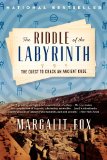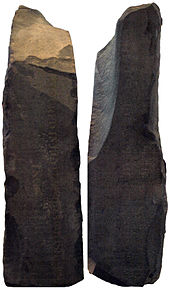Summary | Excerpt | Reviews | Beyond the Book | Read-Alikes | Genres & Themes | Author Bio

Critics' Opinion:
Readers' Opinion:
First Published:
May 2013, 384 pages
Paperback:
Apr 2014, 400 pages
 Book Reviewed by:
Book Reviewed by:
Poornima Apte
Buy This Book
This article relates to The Riddle of the Labyrinth
In The Riddle of the Labyrinth, Margalit Fox describes the challenge of decoding Linear B: "An unknown script used to write an unknown language is a locked-room mystery: Somehow, the decipherer must finesse his way into a tightly closed system that offers few external clues. If he is very lucky, he will have the help of a bilingual inscription like the Rosetta Stone, which furnished the key to deciphering the hieroglyphs of ancient Egypt. Without such an inscription, his task is all but impossible."
 In 1799, in the small village of el-Rashid in the Egyptian delta, soldiers from Napoleon's army discovered the tablet. Because the French troops referred to el-Rashid as Rosetta, the stone came to be known as the Rosetta Stone. After Napoleon was defeated, the stone became the property of the British and has been at the British museum since 1802, except for brief times in storage to protect it from wartime bombing and one month in 1972 when it was lent to the Louvre.
In 1799, in the small village of el-Rashid in the Egyptian delta, soldiers from Napoleon's army discovered the tablet. Because the French troops referred to el-Rashid as Rosetta, the stone came to be known as the Rosetta Stone. After Napoleon was defeated, the stone became the property of the British and has been at the British museum since 1802, except for brief times in storage to protect it from wartime bombing and one month in 1972 when it was lent to the Louvre.
The stone became an important tool in the decipherment of Egyptian hieroglyphics. Carved in 196 B.C., during the rule of Ptolemy V on the first anniversary of his coronation, the tablet records a decree issued by the priests. At the time the tablet was carved, the understanding of hieroglyphics was limited to priests and some members of the ruling class; by the time the tablet was uncovered all knowledge of hieroglyphics had been lost. Fortunately, the Rosetta Stone is written in two different languages (Greek and Egyptian) and three different scripts (Greek, Egyptian hieroglyphic, and Egyptian demotic - the script used and understood by commoners). Once scholars realized that the three sections of the stone recorded essentially the same information, their knowledge of Greek provided a key to deciphering the Egyptian texts.
 Despite the fact that the Greek part of the Rosetta Stone could be read relatively easily, the process of decipherment took a while and many people played important roles in unraveling its mysteries. An English physicist named Thomas Young realized that some of the hieroglyphics sounded out Ptolemy's name while French scholar Jean-François Champollion, widely credited as laying the basis for much of the decipherment, discovered that some of the hieroglyphics spelled out sounds of the Egyptian language. Hieroglyphics was not exclusively a logographic writing system like Chinese where one symbol stands for either a concept or a thing and each word of the language is written with a separate symbol. One hieroglyphic character could be a concept or thing, but it could also simply spell out a sound. This important finding paved the way for further decipherment of the Rosetta Stone.
Despite the fact that the Greek part of the Rosetta Stone could be read relatively easily, the process of decipherment took a while and many people played important roles in unraveling its mysteries. An English physicist named Thomas Young realized that some of the hieroglyphics sounded out Ptolemy's name while French scholar Jean-François Champollion, widely credited as laying the basis for much of the decipherment, discovered that some of the hieroglyphics spelled out sounds of the Egyptian language. Hieroglyphics was not exclusively a logographic writing system like Chinese where one symbol stands for either a concept or a thing and each word of the language is written with a separate symbol. One hieroglyphic character could be a concept or thing, but it could also simply spell out a sound. This important finding paved the way for further decipherment of the Rosetta Stone.
So what exactly does the Rosetta Stone say? It is essentially a list of the Pharaoh's good deeds, recorded by the priests. An example: "He hath in consequence expended a very large amount of money and of grain on them in order to make prosperous the lands of Horus and Egypt."
The Rosetta Stone is displayed in the British Museum in London. You can visit it virtually via the the Museum's blog.
Filed under Cultural Curiosities
![]() This "beyond the book article" relates to The Riddle of the Labyrinth. It originally ran in July 2013 and has been updated for the
April 2014 paperback edition.
Go to magazine.
This "beyond the book article" relates to The Riddle of the Labyrinth. It originally ran in July 2013 and has been updated for the
April 2014 paperback edition.
Go to magazine.




Not doing more than the average is what keeps the average down.
Click Here to find out who said this, as well as discovering other famous literary quotes!
Your guide toexceptional books
BookBrowse seeks out and recommends the best in contemporary fiction and nonfiction—books that not only engage and entertain but also deepen our understanding of ourselves and the world around us.